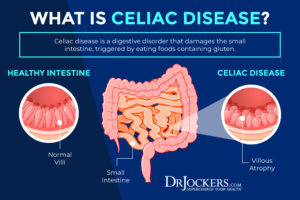The symptoms of Celiac Disease can be:
The signs and symptoms of celiac disease can vary greatly and differ in children and adults. Digestive signs and symptoms for adults include:
- Diarrhea
- Fatigue
- Weight loss
- Bloating and gas
- Abdominal pain
- Nausea and vomiting
- Constipation
However, more than half the adults with celiac disease have signs and symptoms unrelated to the digestive system, including:
- Anemia, usually from iron deficiency
- Loss of bone density (osteoporosis) or softening of bone (osteomalacia)
- Itchy, blistery skin rash (dermatitis herpetiformis)
- Mouth ulcers
- Headaches and fatigue
- Nervous system injury, including numbness and tingling in the feet and hands, possible problems with balance, and cognitive impairment
- Joint pain
- Reduced functioning of the spleen (hyposplenism)
Children
Children with celiac disease are more likely than adults to have digestive problems, including:
- Nausea and vomiting
- Chronic diarrhea
- Swollen belly
- Constipation
- Gas
- Pale, foul-smelling stools
The inability to absorb nutrients might result in:
- Failure to thrive for infants
- Damage to tooth enamel
- Weight loss
- Anemia
- Irritability
- Short stature
- Delayed puberty
- Neurological symptoms, including attention-deficit/hyperactivity disorder (ADHD), learning disabilities, headaches, lack of muscle coordination and seizures
Some patients may have no symptoms yet but if this disease is in your family definitely get checked for it! You get on top of it before the celiac disease gets you first!
Treatment:
There’s no cure for celiac disease — but for most people, following a strict gluten-free diet can help manage symptoms and promote intestinal healing.
Currently, the only treatment for celiac disease is lifelong adherence to a strict gluten-free diet. People living gluten-free must avoid foods with wheat, rye and barley, such as bread and beer.
Ingesting small amounts of gluten, like crumbs from a cutting board or toaster, can trigger small intestine damage.
Celiac disease is also known as coeliac disease, celiac sprue, non-tropical sprue, and gluten sensitive enteropathy.

